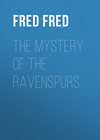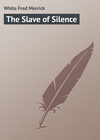Read the book: «Hard Pressed», page 7
CHAPTER XIX
THE EMPTY HOUSE
THERE was just enough moonlight for Phillips' purpose, but not enough to render his task dangerous. Fielden asked no questions, partly because he deemed it would be useless, and partly because he did not wish to spoil what appeared to have in it the making of a dramatic adventure. His spirits were rising, and he was looking forward keenly to something in the way of enterprise. He and Phillips had been in more than one tight place together, and he had every confidence in his companion.
They made their way along the main street in silence, and came presently to the deserted racecourse. There was very little evidence of the afternoon's sport, nothing but a few partially dismantled tents and booths, and the extraordinary remnants of reeking humanity that always haunt a race meeting.
They went across the heath, and by and by Phillips pulled up in front of the avenue to The Nook.
"This is the place," he said quietly.
"Oh, is it?" Fielden asked. "Perhaps you had better tell me before we go farther who lives here."
"That is precisely what we've come to find out," Phillips said coolly. "I've got a pretty shrewd notion, but that isn't good enough for me. I've told you that there's a gang of clever swindlers in England who have put their heads together to rob the betting ring of an enormous sum of money. Operations began last autumn, but the flat-racing was nearly finished, so that they did not make quite such a haul as they had anticipated. Still, they made enough to keep themselves in luxury all the winter and to find the necessary funds for carrying on the campaign in the spring. It is a big combine, and unless something is done to stop it, these people will make colossal fortunes. Mind you, one or two of the large bookmakers have a suspicion, but up to now they haven't been able to prove anything. Indeed, without egotism, I may say they would be powerless without me. I got some vague idea of the scheme three years ago from a man who is now dead. Then when racing began again this year I fancied I could see a trace of the same idea in this business. I knew I was right when I discovered that Copley was operating on a large scale. I lunched at the Post Club with a member who gave me an introduction to Rickerby, the financial agent. You remember him?"
"I ought to," Fielden said drily. "Goodness knows, his firm had enough of my money. But go on."
"Well, I pumped Rickerby. I don't mind telling you that I went to the Post Club on purpose. He has been pretty hard hit. He believes he has been the victim of a swindle, and he is right, though it was no part of my policy at the time to tell him so. He can't very well refuse to take big bets, even when he feels there is something underhand going on. Only a short time ago he was hit for some thousands of pounds by one of the gang, and, moreover, had to pay the money."
"This sounds very interesting," Fielden said, "but what has it to do with our present adventure?"
"Oh, I am coming to that," Phillips went on quietly. "You see, these bets are always made in the same way. One of the conspirators, who is actually a member of the Post Club, strolls into the smoking-room some five or six minutes before – well, we'll say before the three o'clock race. He hangs about till the horses are about finishing and then, in the most casual way in the world, makes a bet. Now, mind you, this bet is booked before the race is finished, as a careful comparison of the time shows. Yet the horse has won, and the man in the smoking-room of the Post Club knows it before the judge has given his decision."
"Impossible," Fielden exclaimed.
"I know it seems impossible, and twenty years ago you would have said the telephone was impossible, and people would have scouted the idea of wireless telegraphy. But they both came, like the phonograph and other wonders."
"Oh, that's all very well," Fielden smiled. "But you are not going to ask me to believe that this thing is done by thought-reading or anything of that sort? You won't tell me that this famous member of the Post Club is a clairvoyant who sees the race finished while it is being run? Because, if that were the case, the favoured person would have no need of a syndicate to help him; he would do it all by himself."
"I am not suggesting anything of the kind," Phillips said. "There's nothing occult about the business. The thing is capable of explanation, and I am in a position to give it, except for the finishing touches, which make this dodge almost a work of genius. I know who is at the bottom of it, I know who is working it, and I know how the information is conveyed to within a few feet of the tape machines in the Post Club. But how that information is filtered to the man inside is the thing that beats me at present. But so much I have found out. In the very next office to the smoking-room of the Post Club is a firm who call themselves Jolly & Co. Now Jolly & Co. only took their office last September or October. There is not the slightest sign of any business being done there, because I have been in the office myself. Taken in conjunction with what I have told you, it must strike you as an odd thing that this mysterious Jolly & Co. shut up the office and went abroad last year after the flat-racing was over. Probably Jolly & Co. went off to make a bit in the Riviera, or Egypt, or some other fashionable resort where fools and money congregate. It is an odd thing that during the January meeting at Mirst Park Jolly & Co. should turn up again and resume operations in Covent Garden. Now I called to see Mr. Jolly. He had left his office, but I guessed that before I called, or I shouldn't have ventured. The first thing I saw was a telephone with an unusually long flex to it. I don't quite understand why this flex is so long, but I can make a shrewd guess. It cost me an hour or two and plenty of hard thinking to get farther in my investigations, but I found late in the evening that Jolly & Co.'s telephone was a private wire leading from Covent Garden to his residence at Mirst Park. Now do you begin to understand?"
Fielden shook his head.
"It begins to smell suspicious," he said. "I am bound to confess it looks very like a deep-laid conspiracy. But I must confess myself too dense to follow it."
"Oh, it requires explanation. But luck favoured me in my investigations, and I managed to pick up a good many unlooked for clues. Still, the fact remains that from this house here to an office next door to the Post Club there is a private telephone. Now a child would admit that no one would have a private telephone from here to an office in London, at a cost of something like a hundred and fifty pounds a year, merely for the sake of sending domestic messages. I came here to have a good look at The Nook, as this house is called, and I found, not altogether unexpectedly, that nobody was living here. I was told by a gardener that the tenant had not yet taken possession, though it has been furnished for some time. I had rung the bell a few times, and when the man came professed I had called to see some one who used to live here. Considering that it is supposed to be a fully-furnished house, that bell made a great deal of noise. I am ready to bet that the house is practically empty. At any rate, I have come here to find out for myself, and as I believe there is nobody on the premises our task ought not to be difficult."
"I don't like it," Fielden said. "It smells very much like burglary, and if we were discovered we should find some difficulty in giving an explanation which would satisfy the police. Isn't there any other way?"
Phillips waved the suggestion aside impatiently.
"You can go back if you like, sir," he said. "As for me, I will see this thing through. We might never have such an opportunity again. And, besides, I want to have a look at that telephone. I think we shall find something that will open our eyes. I am not in a position actually to prove it, but I am convinced that Jolly & Co. will be found to be part and parcel of Copley and Foster. Now you understand why I am so anxious to enter the house. Still, if you prefer to remain outside and leave the matter to me – "
"Oh, no," Fielden said hastily. "Having come so far I won't turn back. I am taking it that you are correct in thinking the house is empty."
"Of course it is, there is no question about that. The gardener told me so, and I see no reason to doubt his statement. I wouldn't miss this chance for anything. Even if I get nothing out of it, I should like to know how this swindle is being worked. But come along, we are wasting time. There is enough moonlight to help us without using lights, which is so far fortunate. It may be a little awkward for you, connected as you are with Copley, but it is all in the game."
"Lead on," Fielden said curtly.
They turned into the avenue and came presently to the front of the house. Somebody had evidently been in since Phillips' visit, for all the blinds had been pulled down. Then they walked cautiously round, looking for a weak spot where they could effect an entrance.
CHAPTER XX
INSIDE
THE adventurers managed to squeeze through a scullery window, the latch of which had not been secured, and a moment later were in the house. As Phillips had surmised, the place was empty. There were, however, cooking utensils in the kitchen, a quantity of plates and dishes and glass, with two baskets containing a small supply of cutlery and silver. Floorcloth had been laid down on the kitchen floor and a carpet in the hall, and there were carpets on the stairs, but three of the four living-rooms on the ground floor were empty. But the fourth room was comfortably furnished. A fire was still burning in the grate, and on the tiled hearth Phillips detected the ends of two or three cigarettes. There was a faint aroma of tobacco on the air, not the sort of tobacco likely to be consumed by a caretaker.
"It is just as I told you," Phillips chuckled. "I felt sure we should find the house empty."
"Yet you are not altogether right," Fielden replied. "Somebody has been here recently, and somebody who knows how to appreciate a good cigarette. Besides, look at that fire. I don't like it, Phillips, and wish we were well out of it. We don't happen to be in South Africa now."
"Oh, that's all right," Phillips said cheerfully. "No doubt the fire was lighted this morning by the gardener, and no doubt also one of the conspirators has been here. In fact, I should have been disappointed if I hadn't found traces of him. It isn't necessary for our friends to come often, but they couldn't very well work their scheme unless they were on the spot when racing is taking place at Mirst Park. I wonder what our friend thought of the snowstorm about three o'clock. I guess that must have upset his calculations a bit. Now look at this."
Phillips bent down to the fireplace and lifted one of the cigarette ends, which he handed to Fielden.
"Do you know anybody who smokes these?" he asked.
"I think so," Fielden said after close inspection. "They are particularly expensive cigarettes, and can't be had unless specially ordered. The only man I know who smokes them is Raymond Copley."
"Precisely. And you may bet your boots this is one of his. At any rate, it is a curious coincidence, and tends to confirm what I have already told you. I should be greatly surprised if Copley were not here this afternoon. Now let us get a bit farther. There is nothing to detain us after we have examined the telephone. I am afraid we shall have to use a match, but, then, we are bound to take certain risks."
By the aid of a box of vestas the telephone instrument was found in the hall. It presented no special features. It appeared to be the kind of hanging instrument to be seen in hundreds of offices and private houses.
"Nothing remarkable about that," Fielden said.
For the moment Phillips made no reply. He fetched a chair from the kitchen and mounted it. After the expenditure of two or three matches, the ends of which he was careful to deposit in his pocket, he broke into a smile.
"Ah, I expected something like this," he said. "There is an extension to this instrument. If you look in the angle of the wall you will see that it goes up to the ceiling. To tell you the truth, I am glad to find this, because it bears out what strikes me as a very plausible theory. I was rather disappointed to find the telephone here at all. But now I can understand why it was placed in this particular spot. We have a cunning lot to deal with, and it was to be expected they would not do things like other people. Let us go upstairs and see how far this extension goes. To the roof, unless I am mistaken."
The exploration proved troublesome, but the extension was traced to the second floor and thence along the ceiling, where it finally disappeared through a skylight which gave on to the roof. An iron ladder was attached to the skylight, and Phillips pointed out to his companion that the ladder appeared to have been regularly used. The iron rungs were worn bright, the sides were clean and shiny.
"Come along," Phillips whispered. "We must get out on the top. But be cautious and display as little light as possible. I daresay we can manage with a solitary match."
They found themselves on the roof presently. By feeling about they could trace the flex of the extension to a square wooden box screwed down to the leads. The box did not appear to be locked, and it was easy for Phillips to fumble about inside it until he drew out a cylinder of gutta percha with something glittering at either end.
"Stoop down and light a match," he whispered, "and hide the flame under your coat. Now, then, bend down here. That's right."
The match burst into flame under cover of Fielden's coat. The feeble light displayed another telephone receiver attached to the end of a somewhat long flex.
"You can blow out the match," Phillips went on, "and don't forget to put the end in your pocket. It is just as well to be careful when dealing with such a gang. Perhaps you begin to understand? You don't know, I expect, that this roof commands the whole racecourse, and enables one to see everything from start to finish. Now a man could sit down here on this box and watch the race with the telephone receiver to his mouth. If he were a really good judge of racing – I mean, if he were any good as a judge of a finish – he would be able to spot the winner in nine cases out of ten fifty lengths from home, and therefore, if there was some one at the other end in the office of Jolly & Co., the result of a particular race would be known in London before the horse was past the post. Do you follow?"
"Yes, that's all very well," Fielden objected, "but that does not account for the fact that – "
"That the information is conveyed in the smoking room of the Post Club. Of course it doesn't. That, I confess, is where I am beaten for the present. I am certain that a second later the confederate in the Post Club knows what has happened. Don't ask me to tell you how the final touches are put on, because I don't know. But, knowing as much as I do, we shall soon find out, and I think you will admit that we haven't wasted our evening. You understand now why either Copley or a confederate was here this afternoon. The man, whoever he was, came with the intention of sending the result of the three o'clock race to Covent Garden. Why the three o'clock race is always picked out for this swindle we don't know, but that will be made plain sooner or later. They didn't make anything yesterday or to-day, because on both occasions the race was run in a snowstorm. It was the snowstorm that first put the idea into my head; in fact, it was the snowstorm that led me here at all. And now, let us go back to my lodgings and discuss the matter over a cigar."
The telephone receiver was replaced in its box, the lid shut down, and the investigators began their descent to the lower rooms. They had not forgotten to be cautious and walked as quietly and carefully as if the house were occupied, which was, perhaps, as well, for as they reached the first-floor landing there came the scratch of a match downstairs. It was only a slight noise, but in the empty house it boomed loudly in the ears of the explorers. The match had been struck to light the gas, for a moment later the hall blazed up brightly, and Fielden and his companion, looking over the banisters, saw two men in the hall.
"Have you made up a fire in the dining-room?" one of them asked. "You haven't? Well, do so at once. I am half frozen. It's precious poor fun motoring from London on a night like this. Did you bring in the hamper?"
Phillips started at the sound of the voice.
"This is awkward," he whispered. "I wish to goodness we had gone five minutes sooner. It will be worse for you than for me if we are found out. Did you recognize that voice?"
"Copley," Fielden muttered. "I'd give something to be out of this. The other man is Foster, of course. I wonder what ill luck brings these fellows here to-night. Still, as all these rooms are empty they are not likely to come upstairs. But they mean to stay, or Copley would not have been so fastidious about the fire."
"They are going to make a night of it," Phillips replied. "Judging from that remark about the hamper, they have brought supper with them, expecting somebody else, very likely. Well, there is nothing for it but to wait. If we could only put out the gas in the hall we might have a chance. We can slip down while they are at supper and leave by the way we came. We must have that gas out."
"They would only light it again."
"Not if I plug the burner. I'll go and look for a piece of wood. It is likely the carpenters have left some behind: they generally do. If I can find a piece about four feet long, the trick will be done."
CHAPTER XXI
THE EAVESDROPPERS
TO Fielden, waiting, it seemed that Phillips was a long time away. While he stood looking over the banisters he learned that the fire had been made up downstairs. With grim amusement he watched Foster open the hamper and take from it certain delicacies which formed the foundation of what promised to be an exceedingly good supper. There were sundry bottles, too, with gold foil about the necks, and when the hamper had been emptied Foster repaired to the kitchen and presently reappeared with a tray laden with plates and dishes, the requisite number of glasses and knives and forks, and a tablecloth. Judging from the smell, Copley was smoking in the dining-room whilst his accomplice was preparing the supper. Matters had progressed thus far when Phillips stole gently back, carrying a long very thin slip of wood from a broken board, the end of which he had whittled to a fine point.
"I've found it," he said. "If I lean over the banisters I can jam the point of this stick into the eye of the burner, and put out the gas. They won't be able to light it again for a while. Is it safe?"
The sudden pop of a cork was heard.
"Sounds like it," Fielden whispered. "I think Foster carried in everything and they are at supper. Now is your time."
Phillips leant over the banisters, and at the second attempt thrust the sharpened end of the long strip of wood into the eye of the burner. There was a feeble flicker or two, and then the whole place was wrapped in darkness. He was only just in time, for almost on the same instant Foster came out of the dining-room. They heard him muttering that the gas had gone wrong, and watched him, faintly outlined by a match, strive in vain to light the gas once more. After the third attempt he abandoned the effort with an oath and went back to the dining-room. Straining their ears, the two men on the landing could hear Copley's reply.
"Choked up with dust, I suppose. But never mind so long as we are all right. Sit down and eat. I daresay those other fellows will be some time yet."
Phillips whispered in his companion's ear.
"I think we shall be safe. What do you say to creep away now we have the opportunity? Or would it be worth while to stay outside the dining-room and listen to what they're talking about? It is pitch dark, and we can slope at any moment."
Fielden was feeling reckless. It did not matter what happened. Without further ado they tiptoed into the hall where, by the aid of the intense stillness and a door ajar, they commanded all that was going on. Copley sat at one end of the table, facing Foster at the other. For some time the two men ate steadily with an appetite sharpened by their drive through the cold air. When the meal was finished Copley pushed his chair aside and strode over to the fireplace. Would Foster remove the supper things? He had begun to gather the plates and dishes together when Copley stopped him.
"Oh, never mind the things," he said impatiently. "Let the man remove them in the morning. He can finish up what is left. We have more important matters to attend to. Take a cigar and sit down by the fire. What is the next move?"
"We have had cruel bad luck," Foster replied. "Who would have expected to have two race-days ruined by snowstorms? A prophet could not have foreseen anything like this. I reckon we have lost twenty thousand pounds the last two days."
"It's a bad start," Copley answered. "We didn't have the luck, and we haven't made the money. I was on the roof yesterday and to-day, and I declare to you I couldn't see a single incident in the race. I've never seen two such blinding snow showers. It was simply maddening to stand there and feel a fortune supping through your fingers, all on account of the snow. And that's not the worst, Foster. It will be another month before there will be two days' racing at Mirst Park, and we can't count upon a single penny till then. I tell you frankly I don't know where to turn for ready cash. It's all very fine to have tradesmen breaking their necks to get my custom, but that doesn't fill my purse with the needful. It's very odd that a man in my position can procure almost any article of value he pleases, but when it comes to raising a bit of cash everybody's suspicions are aroused at once."
"Well, philosophy won't help us," Foster said. "We must annex some ready money to carry us over the next month, at any rate. The same ill luck can't happen at the next meeting. Such a coincidence couldn't happen twice. Don't forget that if we can manage to hang on for four weeks we shall make enough to carry us on to the Derby, and after the big race is run we shall be in clover. If you work your cards properly the Blenheim colt is bound to lose, and with this knowledge we can lay against the horse as long as anybody is fool enough to take our bets."
"I haven't forgotten that," Copley said. "Of course, I haven't spoken to Sir George about it yet, but I have asked him to dine with me on Sunday evening at Seton Manor, and I shall put on the screw then. He'll kick at first. He'll talk about the blood of his ancestors and the honour of his race and all that kind of rot, but he is bound to give in. If I asked him to-night he would say he would rather leave Haredale Park and beg his bread before he would do anything to be ashamed of. We have both heard people talk like that before now, but when it comes to the point Sir George will sing another tune. They all do."
"Provided the lady does not change her mind," Foster said with a grin, which caused Fielden, listening at the door, to clench his fists. "You mustn't lose sight of that fact, Copley. Miss Haredale dislikes and despises you. But though she vows that nothing in the world will induce her to marry you, circumstances alter cases, and when she knows she is no longer mistress of Haredale Park, it is possible her frowns may turn into smiles."
Copley laughed unpleasantly.
"I haven't lost sight of these things," he said. "Miss Haredale has the bad taste to dislike me exceedingly. I would give anything if I could induce her to change her mind. I believe I might even grow honest and lead a respectable life. Still, that would be beastly monotonous. Your plan is the best. I had better accept my dismissal and leave Miss Haredale to go her own way. Then I can put the screw on Sir George and compel him to find some excuse for scratching his colt. When he sees that I mean to have my money and discovers the sheriff in possession, he will not be long in inventing a reason why the Blenheim colt should not run that shall be consistent with his confounded dignity. You can leave that safely to me, Foster. My word, how cold it is! I wish you would shut that door. The draught is cutting my legs off. I daresay – "
What Copley was about to say was lost to the listeners in the hall by the closing of the door. They could hear nothing save a murmur of voices which conveyed nothing to their ears. Phillips touched his companion's shoulder.
"Here's our chance," he whispered. "The sooner we are off the better. We cannot learn anything more this evening; indeed, there cannot be much more to learn."
They stole cautiously along the hall, through the kitchen and outhouses, and were soon outside safe under cover of the darkness. It was black enough now that the moon had gone down, and they could move freely into the road and across the heath to the village.
"Well, what do you think of these precious rascals?" Phillips asked. "Don't you agree that we are deep in the secrets of a vile conspiracy? We can't leave it where it is."
"Most certainly not," Fielden said. "At present I am thinking more about Sir George Haredale than of anybody else. A year or two ago I should have scorned the idea of his doing anything dishonourable. But I have learnt worldly wisdom, and can imagine how it would be if Sir George were suddenly face to face with poverty. He is completely under Copley's thumb. If these two men bring off their coup, they will make an enormous fortune. But it must be prevented at all costs, Phillips. Think out some scheme of checkmate, and I shall be your debtor for the rest of my life."
"I think I can manage that," Phillips said. "I'll tell you what my plan is when we get back to my rooms."















